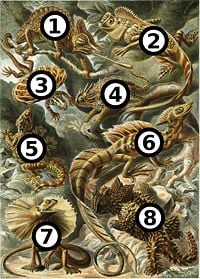Difference between revisions of "File: Haeckel Lacertilia.jpg" - New World Encyclopedia
Rick Swarts (talk | contribs) ([http://en.wikipedia.org/wiki/Image:Haeckel_Lacertilia.jpg source and rights]) |
Rick Swarts (talk | contribs) |
||
| Line 1: | Line 1: | ||
[http://en.wikipedia.org/wiki/Image:Haeckel_Lacertilia.jpg source and rights] | [http://en.wikipedia.org/wiki/Image:Haeckel_Lacertilia.jpg source and rights] | ||
| + | |||
| + | == Summary == | ||
| + | The 79th [[w:lithography|lithographic]] plate from [[w:Ernst Haeckel|Ernst Haeckel]]'s ''[[w:Kunstformen der Natur|Kunstformen der Natur]]'' (1904) depicts a variety of lizards, or ''[[w:Lizards|Lacertilia]]''. In terms of evolutionary relationships, these eight lizards demonstrate the diversity of the ''Lacertilia'' suborder, which has been replaced by an array of new [[w:Scientific_classification#Terminations_of_names|suborders and infraorders]] in recent classifications. Unusual species of [[w:Chameleon|chameleon]] and [[w:Gonocephalus|gonocephalus]] are at the top; the second row has a [[w:Flying dragon|flying dragon]] and a [[w:Texas horned lizard|Texas horned lizard]]; the third row has a [[w:Ptychozoon|flying gecko]] and a [[w:Common basilisk|common basilisk]]; on the bottom row are the aptly named [[w:frill-necked lizard|frill-necked lizard]] and the [[w:Thorny Devil|Thorny Devil]]. As in many of Haeckel's prints, the colors and spatial composition are more of an aesthetic choice than a reproduction of nature; the lithographer Adolf Glitsch worked directly from Haeckel's sketches rather than from first-hand specimens. | ||
| + | |||
| + | [[Image:Haeckel_Lacertilia_big_spots.jpg|right|200px]] | ||
| + | Species | ||
| + | #''[[Chamaeleon montium]]'' (now: ''[[Chamaeleo montium]]'') | ||
| + | #''[[Lophyrus tigrinus]]'' (now: ''[[Gonocephalus chamaeleontinus]]) | ||
| + | #''[[Draconellus volans]]'' (now ''[[Draco volans]]'') | ||
| + | #*{{English}} [[w:Flying dragon|Flying dragon]] | ||
| + | #''[[Phrynosoma cornutum]]'' | ||
| + | #*{{English}} [[w:Texas horned lizard|Texas horned lizard]] | ||
| + | #''[[Ptychozoon homalocephalum]]'' (aka [[Flying gecko]]) | ||
| + | #''[[Basiliscus americanus]]'' (aka ''[[Basiliscus basiliscus]]'') | ||
| + | #*{{English}} [[w:Common Basilisk|Common Basilisk]] | ||
| + | #''[[Chlamydosaurus kingii]]'' | ||
| + | #*{{English}} [[w:Frill-necked Lizard|Frill-necked Lizard]] | ||
| + | #''[[Moloch horridus]]'' | ||
| + | #*{{English}} [[w:Thorny Devil|Thorny Devil]] | ||
Latest revision as of 01:15, 11 August 2007
Summary
The 79th lithographic plate from Ernst Haeckel's Kunstformen der Natur (1904) depicts a variety of lizards, or Lacertilia. In terms of evolutionary relationships, these eight lizards demonstrate the diversity of the Lacertilia suborder, which has been replaced by an array of new suborders and infraorders in recent classifications. Unusual species of chameleon and gonocephalus are at the top; the second row has a flying dragon and a Texas horned lizard; the third row has a flying gecko and a common basilisk; on the bottom row are the aptly named frill-necked lizard and the Thorny Devil. As in many of Haeckel's prints, the colors and spatial composition are more of an aesthetic choice than a reproduction of nature; the lithographer Adolf Glitsch worked directly from Haeckel's sketches rather than from first-hand specimens.
Species
- Chamaeleon montium (now: Chamaeleo montium)
- Lophyrus tigrinus (now: Gonocephalus chamaeleontinus)
- Draconellus volans (now Draco volans)
- Template:English Flying dragon
- Phrynosoma cornutum
- Template:English Texas horned lizard
- Ptychozoon homalocephalum (aka Flying gecko)
- Basiliscus americanus (aka Basiliscus basiliscus)
- Template:English Common Basilisk
- Chlamydosaurus kingii
- Template:English Frill-necked Lizard
- Moloch horridus
- Template:English Thorny Devil
File history
Click on a date/time to view the file as it appeared at that time.
| Date/Time | Thumbnail | Dimensions | User | Comment | |
|---|---|---|---|---|---|
| current | 01:14, 11 August 2007 |  | 733 × 1,023 (283 KB) | Rick Swarts (talk | contribs) | [http://en.wikipedia.org/wiki/Image:Haeckel_Lacertilia.jpg source and rights] |
You cannot overwrite this file.
File usage
The following page uses this file:
